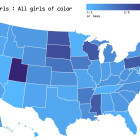It’s More Than Time to Raise the Age in Michigan
|
In Michigan, 17-year-olds are not allowed to buy lottery tickets, get a tattoo, rent a car or hotel room or drop out of school. They can’t vote, serve on a jury or sign a legal contract either, presumably because they don’t possess the requisite maturity to make adult-level decisions. This distinction, however, is tossed out the window if a 17-year-old breaks the law. Suddenly, they are adults, facing devastating repercussions that can come with an adult conviction.








